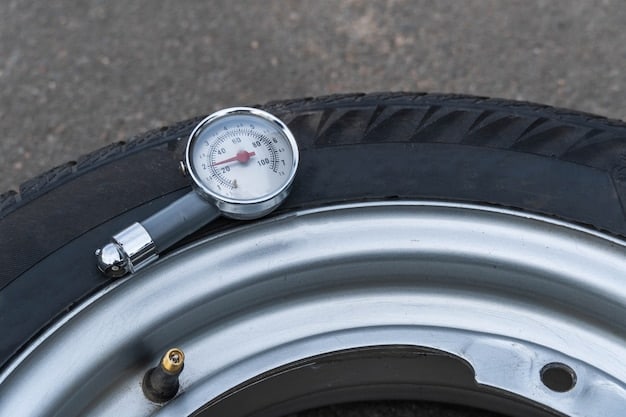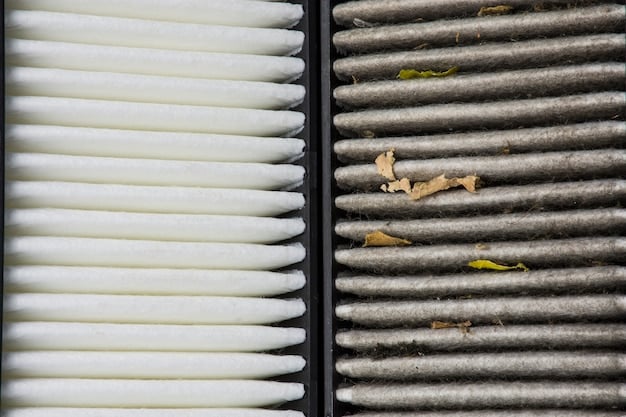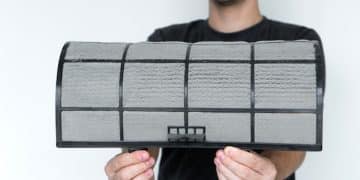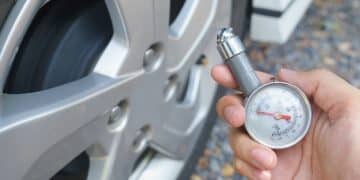Save $300 Annually: Boost Your Car’s Fuel Efficiency Now!

Save $300 Annually: Optimize Your Car’s Fuel Efficiency with These Simple Maintenance Tweaks involves crucial car care habits, such as regular tire inflation, air filter replacement, fluid checks, and mindful driving, which can significantly improve gas mileage and reduce annual fuel expenses.
Want to keep more money in your pocket? Save $300 Annually: Optimize Your Car’s Fuel Efficiency with These Simple Maintenance Tweaks and small adjustments in your driving habits can make a big difference in your gas mileage.
Easy Tire Inflation for Maximum Mileage
Keeping your tires properly inflated is one of the simplest and most effective ways to improve your car’s fuel efficiency. Underinflated tires increase rolling resistance, which means your engine has to work harder to move the car, leading to increased fuel consumption.
The Importance of Correct Tire Pressure
Maintaining the correct tire pressure not only improves fuel economy but also enhances safety and extends the life of your tires. Correctly inflated tires provide better handling, reduce the risk of tire blowouts, and wear more evenly over time.
How to Check Your Tire Pressure
Checking your tire pressure is a breeze. You’ll need a reliable tire pressure gauge. You can find the recommended tire pressure for your vehicle on a sticker inside the driver’s side doorjamb or in your owner’s manual.
- Use a tire pressure gauge to check the pressure in each tire, including the spare.
- Make sure tires are cold – meaning they haven’t been driven on recently – for accurate readings.
- Inflate or deflate tires as needed to match the recommended pressure.
- Check tire pressure at least once a month and before long trips.
Regularly checking and maintaining your tire pressure is a quick and cost-effective way to save $300 annually and keep your vehicle running efficiently.

Replace Your Air Filter for Better Performance
A clean air filter is essential for optimal engine performance and fuel efficiency. The air filter prevents dirt, dust, and debris from entering your engine. Over time, it can become clogged, restricting airflow and causing your engine to work harder, which decreases fuel mileage.
Why a Clean Air Filter Matters
A clogged air filter reduces the amount of oxygen available to the engine, leading to incomplete combustion and reduced power. This not only decreases fuel efficiency but can also cause engine knocking, rough idling, and reduced acceleration.
When to Replace Your Air Filter
Most manufacturers recommend replacing the air filter every 12,000 to 15,000 miles, or once a year. However, if you drive in dusty or polluted conditions, you may need to replace it more frequently.
- Check your air filter regularly by holding it up to a light source. If you can’t see light through it, it’s time for a replacement.
- Refer to your owner’s manual for specific replacement intervals.
- Consider a high-performance air filter for improved airflow and engine performance.
Replacing your air filter is a simple maintenance task that can significantly improve your car’s fuel efficiency. Don’t wait to save $300 annually by letting your engine breathe freely with a new filter.
Maintain Fluid Levels for a Smooth Ride
Maintaining proper fluid levels is essential for the smooth and efficient operation of your vehicle. Fluids such as engine oil, transmission fluid, coolant, and power steering fluid lubricate, cool, and protect critical components. When these fluids are low or dirty, it can lead to increased friction, overheating, and decreased fuel efficiency.
The Role of Each Fluid
Each fluid in your car plays a crucial role in maintaining its performance and efficiency. Engine oil lubricates the engine’s moving parts, reducing friction and preventing wear. Transmission fluid ensures smooth gear shifts. Coolant prevents the engine from overheating. Power steering fluid provides hydraulic assistance for easy steering.
Checking and Topping Off Fluids
Checking your fluid levels is a fundamental part of car maintenance. Luckily, it is quite simple. Most fluids have a dipstick or a visible level indicator on the reservoir.
- Check your engine oil level at least once a month using the dipstick.
- Inspect the coolant level in the coolant reservoir and top it off as needed.
- Check the power steering fluid level and add fluid if it’s below the minimum mark.
- Have your mechanic inspect the transmission fluid level and condition during routine maintenance.
Regular fluid checks and maintenance will ensure your car runs smoothly and efficiently, helping you to save $300 annually on fuel and repairs.

Drive Mindfully to Reduce Fuel Consumption
Your driving habits have a significant impact on your car’s fuel efficiency. Aggressive driving, such as rapid acceleration, hard braking, and speeding, consumes significantly more fuel than smooth, controlled driving. By adopting mindful driving techniques, you can reduce fuel consumption and save money.
The Impact of Aggressive Driving
Aggressive driving habits can decrease your fuel efficiency by as much as 33% on the highway and 5% in the city. Rapid acceleration and hard braking require more energy to accelerate and decelerate the vehicle, wasting fuel in the process.
Tips for Mindful Driving
Mindful driving involves anticipating traffic, maintaining a safe following distance, and accelerating and braking gradually.
- Accelerate smoothly and avoid rapid acceleration.
- Maintain a consistent speed on the highway and avoid speeding.
- Anticipate traffic and avoid hard braking.
- Use cruise control on the highway to maintain a steady speed.
By adopting these mindful driving techniques, you can save $300 annually, reduce fuel consumption and contribute to a safer and more pleasant driving experience.
Streamline Your Car to Avoid Drag
Reducing your car’s aerodynamic drag can significantly improve fuel efficiency, especially at highway speeds. Drag is the force that opposes the motion of your car through the air. The more drag your car experiences, the more fuel it needs to overcome that drag and maintain speed.
Understanding Aerodynamic Drag
Aerodynamic drag is affected by various factors, including the shape of your car, the presence of external accessories, and the speed at which you are traveling. Items such as roof racks, cargo carriers, and oversized tires can increase drag and reduce fuel efficiency.
Practical Steps to Reduce Drag
There are several practical steps you can take to reduce your car’s aerodynamic drag and improve fuel efficiency.
- Remove roof racks and cargo carriers when not in use to reduce drag.
- Keep your car’s windows closed at highway speeds to reduce air turbulence.
- Consider using low-rolling-resistance tires to reduce friction and improve fuel economy.
Streamlining your car is an effective way to reduce drag and save $300 annually. A smooth car will glide through the air more efficiently, resulting in better fuel mileage and lower gas costs.
Service Your Engine for Maximum Fuel Efficiency
Regular engine servicing is essential for maintaining optimal fuel efficiency and performance. Over time, engine components can wear out or become dirty, leading to decreased fuel economy and increased emissions. A properly serviced engine runs more efficiently, saving you money at the pump.
The Importance of Regular Servicing
Regular engine servicing includes tasks such as spark plug replacement, fuel injector cleaning, and engine tuning. These services ensure that your engine is running at its peak efficiency, maximizing fuel economy and minimizing emissions.
Essential Engine Service Tasks
Consult your owner’s manual for recommended service intervals and specific tasks. Stay on top of regular servicing. Keep your car healthy to keep money in the budget!
- Replace spark plugs at the recommended intervals to ensure efficient combustion.
- Clean fuel injectors to remove deposits and improve fuel atomization.
- Check and adjust engine timing to optimize performance and fuel efficiency.
Investing in regular engine servicing is a smart way to save $300 annually. Properly serviced engines will use less fuel and perform optimally, saving you money in the long run.
| Key Point | Brief Description |
|---|---|
| ⛽ Tire Inflation | Maintain recommended tire pressure for better MPG. |
| 🧽 Air Filter | Replace regularly for optimum engine airflow. |
| 💧 Fluid Levels | Keep engine oil, coolant, and other fluids at proper levels. |
| 💨 Driving Style | Drive smoothly and avoid aggressive maneuvers. |
FAQ
▼
You should check your tire pressure at least once a month, and especially before long trips. Use a reliable tire pressure gauge to ensure accurate readings.
▼
Most manufacturers recommend replacing the air filter every 12,000 to 15,000 miles, or once a year. If you drive in dusty conditions, you may need to replace it more frequently.
▼
Key fluids include engine oil, transmission fluid, coolant, power steering fluid, and brake fluid. Regularly check and maintain these to ensure proper vehicle operation.
▼
Aggressive driving—hard accelerations and braking—decreases fuel efficiency by as much as 33% on highways and 5% in the city. Smooth, consistent driving improves MPG.
▼
Regular engine servicing, including spark plug replacement and fuel injector cleaning, ensures your engine runs efficiently, maximizing fuel economy and minimizing emissions.
Conclusion
Optimizing your car’s fuel efficiency through simple maintenance tweaks can save $300 annually. By focusing on tire inflation, air filter replacement, fluid maintenance, mindful driving, streamlining, and regular engine servicing, you can significantly improve gas mileage and reduce fuel expenses.





